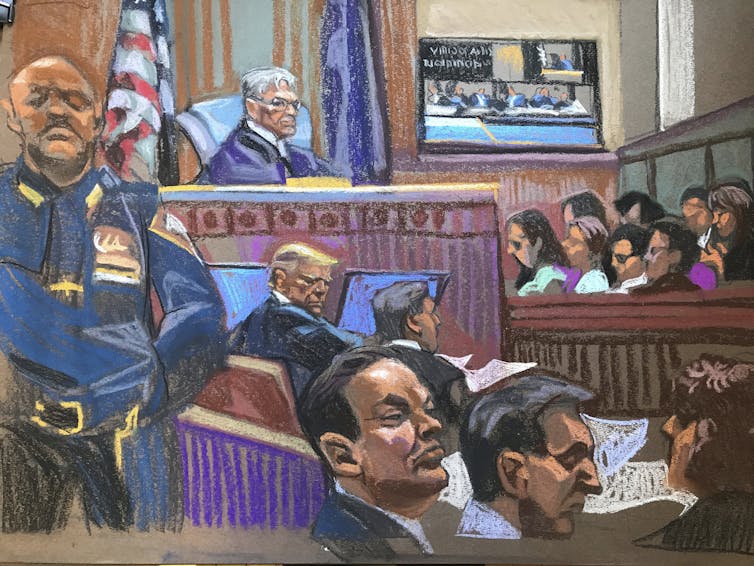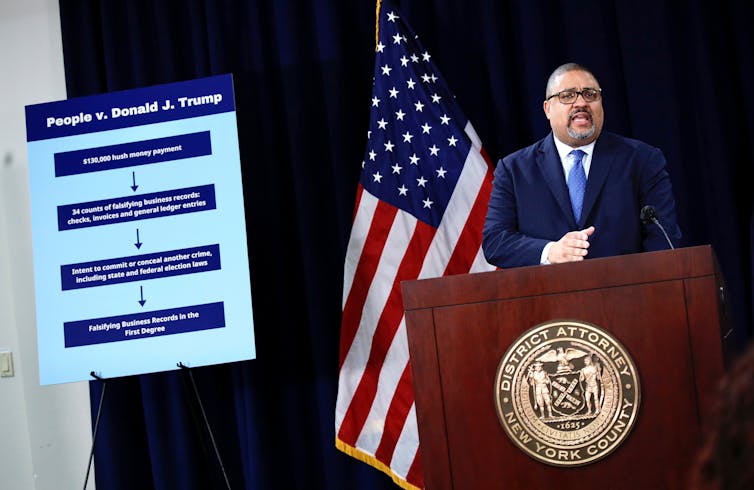What is the next step following the conviction of former President Donald Trump on 34 felony counts of falsifying business documents in New York on May 30, 2024?
It is probable that the verdict will be appealed by Trump’s legal team. Following the jury’s announcement, Trump declared, “We will defend our Constitution.” “This is far from over.” Trump’s sentencing hearing is scheduled for July 11.
In order to gain a more comprehensive understanding of the verdict, Amy Lieberman, the editor of politics and society for The Conversation U.S., engaged in a conversation with Gabriel J. Chin, a scholar of criminal law and procedure.

Judge Juan Merchan, Donald Trump, prospective jurors, and other legal and court personnel are depicted in a courtroom caricature.
1. What was the reason for the proliferation of felony counts in this case?
The fundamental nature of the offenses for which Trump was found guilty is the falsification of documents or records. Consequently, the jurors identified each check, invoice, or other document that was falsified as a distinct offense, which may serve as the foundation for a distinct count and be penalized accordingly. The prosecution sought to ensure that the jury was aware of the full extent of the alleged scheme, which involved Trump concealing the fact that he paid hush money to porn star Stormy Daniels by presenting the payment as a legal charge to his lawyer, Michael Cohen. Cohen allegedly used Trump’s money to bribe Daniels in order to prevent her from discussing her purported affair with him.
2. What is the most critical aspect of this conviction that individuals should comprehend?
The conviction of felonies by a former or future president in the United States is a groundbreaking and historic event. This prosecution will be the subject of debate, and individuals will be required to determine whether it is an illustration of the principle that no individual is above the law or a case of political persecution.
This conviction has a substantial impact on all of Trump’s other criminal and civil cases, as a technical legal matter. At a minimum, this implies that opposing attorneys will be able to challenge Trump’s credibility with this conviction if he is required to testify. Lawyers may contend that any witness who has been convicted of a felony is likely to be deceiving.
In practical terms, this verdict also implies that Trump, who is enrolled to vote in Florida, is unable to vote there until his sentence is completed. He is prohibited from possessing a firearm under federal law. However, he is still eligible to run for president and serve in office, as the Constitution does not prohibit individuals with convictions or who are incarcerated from competing for or serving as president.

On April 4, 2023, Manhattan District Attorney Alvin Bragg addressed a news conference regarding the arraignment of former President Donald Trump.
3. What information can we ascertain, if any, regarding the possibility of his sentence?
Juan Merchan, a judge in New York, will determine the sentence independently, without the involvement of a jury.
It is not unexpected that the sentencing has been scheduled for July, rather than a much earlier date. The probation office will compile a report that delineates the facts and circumstances of this case, as well as Trump’s background and history, as it has done in previous instances. Trump’s absence of a criminal record is typically a favorable sentencing factor. Conversely, he has encountered adverse outcomes from litigation, such as a civil ruling in 2023 that concluded that he had engaged in sexual misconduct. It is important to monitor whether the prosecution or the probation department contends that Trump’s other criminal offenses and civil cases should be taken into account during the sentencing process.
Lack of contrition is a sentencing factor that occasionally is considered; it is frequently the reason judges impose a more severe sentence. Certainly, it does not appear that Trump has acknowledged that he has committed a crime or done something reprehensible. Trump’s violation of the prohibition orders in this case, which the judge has already penalized him for, could also be used to support or impose a more severe sentence.
4. Is it probable that Trump will be sentenced to imprisonment in light of this verdict?
In New York state, the act of falsifying business records is classified as a “Class E” felony, with a maximum sentence of four years. Probation is an alternative to incarceration, or probation may be combined with a brief period of incarceration. In theory, Trump could receive a sentence of 136 years if the maximum sentences on all counts are imposed consecutively, as sentences may be imposed concurrently or consecutively. But, despite the fact that the judge is responsible for determining the sentence, it is logical to assume that Trump will not be sentenced to a lengthy prison term and may even avoid any incarceration. This is based on past precedent.
The Constitution’s prohibition against double jeopardy would have rendered a not-guilty verdict conclusive, as it prohibits the conviction, acquittal, or punishment of an individual for the same offense more than once.
This conviction will undoubtedly be challenged for years, and the appeals process could potentially have at least two opportunities to reach the U.S. Supreme Court. The appropriateness of the state court trial in this case will also be a factor, as the appeal is expected to examine the federal authority over federal elections and election offenses.
To put it differently, this case is far from over. Even if Trump were to be incarcerated, it is probable that he would be permitted to remain free while awaiting an appeal. This practice is not uncommon in high-profile and complex cases, at least when there are reasonable legal claims of error.
5. How was the evidence in this case so compelling that it convinced the jurors?
The New York law’s scope is a contributing factor, as it criminalizes the falsification of internal business records, even when they are private and not used to defraud anyone or cheat the tax system, in contrast to the law in many states. However, in New York, it is generally considered a misdemeanor to falsify private business records. The actions become a felony only if, as the jury determined in this case, they are employed to conceal or obscure a crime.
The jury in this case may have been convinced by the prosecution’s argument that the concealed crime was essentially a conspiracy to defraud the American people by concealing information about a presidential candidate’s character and conduct.
It is possible that the jury was hesitant to dismiss the allegations as routine due to the allegation that Trump had deceived voters. An additional contributing factor is the exceptional investigation that was conducted in the preparation of this case. The prosecution was able to recount the story in a manner that was highly specific due to the abundance of witnesses and documents at its disposal.







